Are Laws Banning ‘Assault Weapons’ Unconstitutional? According To Four Federal Courts Of Appeal, They Aren’t.
Since the Supreme Court handed down its decision in District of Columbia v. Heller four separate Federal appellate courts have ruled that state and local laws banning "assault weapons" do not violate the Second Amendment.
Last week’s massacre at Marjorie Stoneman Douglas in Parkland, Florida has, inevitably, has predictably revived the debate over gun control, and taking center stage in the debate is the idea of banning so-called “assault weapons,” or at least increasing the age limit to purchase such a weapon from 18 to 21. Inevitably, Second Amendment advocates have argued that such a move, or at least the effort to impose an outright ban, would be a violation of the right to keep and bear arms. As The Washington Post’s Meghan Flynn and Fred Barbash note today, though, so far every Federal Court of Appeals that has ruled on the issue has found laws banning such weapons to be acceptable under the Second Amendment, and there appears to be little chance of the Supreme Court intervening to say otherwise at any point in the near future:
Almost exactly a year ago, a federal appeals court considered whether a Maryland law banning assault weapons was unconstitutional.
The law was passed in the aftermath of the Sandy Hook massacre, which left 20 first-graders and six adults dead after a man bearing an AR-15-style weapon stormed the school in Newtown, Conn.
“Nine terrified children ran from one of the classrooms when the gunman paused to reload, while two youngsters successfully hid in a restroom,” Judge Robert B. King of the U.S. Court of Appeals for the 4th Circuit wrote in the majority opinion. ”Another child was the other classroom’s sole survivor. In all, the gunman fired at least 155 rounds of ammunition within five minutes, shooting each of his victims multiple times.”
The court ruled that the ban on assault weapons like the one Adam Lanza used at Sandy Hook — like the one that police say Nikolas Cruz confessed to using at Marjory Stoneman Douglas High School on Feb. 14 and that Omar Mateen used at Orlando’s Pulse Nightclub in June 2016 and Stephen Paddock used from the Mandalay Bay in Las Vegas on Oct. 1 — was constitutional.
It was not the first time a federal appeals court had ruled that a ban on assault weapons was permissible under the Second Amendment. It was the fourth time in the past decade. In fact, no federal appeals court has ever held that assault weapons are protected.
The question of assault weapons was not addressed by the Supreme Court when, in 2008, it held for the first time in District of Columbia v. Heller that the Second Amendment protects an individual right to possess a firearm. Justice Antonin Scalia, writing for the court, went out of his way to say that the right “is not unlimited.”
In each case that has reached a federal appeals court since then, bans on the semiautomatic guns known as assault weapons have been upheld, usually for the same two reasons.
Banning them, the courts have said, does not curtail the right of self-defense protected by the Constitution. There are plenty of other weapons — handguns and regular long guns — available to people to protect themselves.
At the same time, the courts have said, states and municipalities have legitimate reasons to ban AR-15-style weapons because of the dangers they pose, to schools, innocent bystanders and police.
(…)
Gun rights advocates, such as the National Rifle Association, have argued that such a ban would violate the Second Amendment.
As the NRA told the Supreme Court in 2015 as it unsuccessfully sought review of one of the four appeals court rulings: “Firearms that are commonly chosen by law-abiding citizens for lawful purposes cannot be banned. While some contours of the Second Amendment have been left to future evaluation,” it said in an amicus brief, ”at least this much is clear from recent decisions by this Court.”
But that much has not been “clear” to the appeals courts that have reviewed the issue.
For the 4th Circuit judges in the Maryland case, the question came down to whether military-style weapons were necessary for self-defense and whether the government has a legitimate interest in regulating them.
King noted in the majority opinion that Maryland law enforcement officials could not identify a single case in which a Marylander had used a military-style rifle or shotgun, or needed to fire more than 10 rounds, to defend herself.
As Flynn and Barbash note, the Fourth Circuit opinion, although it is the most recent, is consistent with rulings from three other Circuit Courts of Appeal across the country. Each of these cases was fully litigated at both the District Court and Court of Appeals level and in each case, the Supreme Court declined to accept the case for review when asked to do so.
In a 2011 case arising out of the District of Columbia that has dubbed Heller II due to the fact that it involved essentially the same parties as in the Supreme Court’s 2005 ruling in District of Columbia v. Heller, the Court of Appeals for the D.C. Circuit ruled that the District’s ban on “assault weapons” and other weapons with the capability of firing of large amounts of ammunition in a short period of time was Constitutional and that the ban did not impugn the right of self-defense on the right of self-defense recognized by the Supreme Court in the original Heller decision. Additionally, the Court held that the District had sufficient justification to believe that such weapons were too dangerous to be considered effective for self-defense and that such weapons posed “grave risks to bystanders and police officers.
In an April 2015 ruling, the Seventh Circuit Court of Appeals upheld a similar ban enacted by the City of Highland Park, Illinois. In this case, the law in question banned ”any semiautomatic gun that can accept a large-capacity magazine.” In its opinion, the court noted that the relevant law left residents “with many self-defense weapons,” including pistols, handguns, and rifles that did not meet the rather specific definition of a prohibited “assault weapon.” The Court also made note of the dangerous nature of these weapons and noted that they have been the predominant weapon of choice in mass shooting incidents around the country. The court also noted that while a ban on “assault weapons” and high-capacity magazines would probably not prevent all shootings, “but it may reduce the carnage if a mass shooting occurs.” This, the Court noted, was a sufficient factual basis on which to justify a ban on its own. Finally, the Court made note of a constitutional principle that conservatives are often eager to bring up in other situations, federalism and the idea that states and local jurisdictions should generally be free to enact the laws they deem to be appropriate as long as they don’t clearly violate a provision of the Federal Constitution.
Finally, in September 2015, the U.S. Court of Appeals for the 2nd Circuit reached the same conclusion in a case that challenged “assault weapons” bans enacted by New York and Connecticut that banned of “assault weapons” and certain large-capacity magazines in the wake of the 2012 massacre at Sandy Hook Elementary School. While conceding that a ban was “broad and burdensome,” the Court unanimously ruled that the laws were constitutional and not barred by the Second Amendment. The panel noted that weapons such a those subject to the ban “have been understood to pose unusual risks,” resulting in “more numerous wounds, more serious wounds, and more victims.” The court also noted that the weapons are disproportionately used in criminal acts in general and in mass shooting incidents in particular and that they have also been disproportionately “used to kill law enforcement officers.”
As stated, these four cases are the only rulings on state or local laws banning “assault weapons” that have been handed down by a Federal Circuit Court of Appeals in the nine years since the Supreme Court handed down the ruling in District of Columbia v. Heller and the eight years since it handed down its decision in McDonald v. Chicago. In the first case, of course, the Court held that the right protected by the Second Amendment was an individual right that included the right to defend oneself in one’s home. As a result, the Court found that the District of Columbia’s essentially complete ban on owning a handgun was unconstitutional. In McDonald, the Court struck down Chicago’s ban on handgun ownership under essentially the same principles as it had applied two years earlier in Heller. The ruling also held that, like the majority of the rest of the Bill of Rights, the Second Amendment was applicable to the states via the doctrine of incorporation. Since that time, though, the Court has declined to hear essentially any other cases arising under the Second Amendment, including both laws banning “assault weapons” and cases challenging state and local laws regarding concealed carry permits. Most recently, Court this week declined to hear an appeal involving California’s ten day waiting period on the purchase of any firearm. What this means, of course, is that the rulings from these various Circuits remain the law of the land in the Circuits that they were decided in, as well as being persuasive authority for any future District Court or Circuit Court of Appeal that may hear a challenge to an assault weapons ban in the future.
While we can’t necessarily draw any conclusion from the Court’s decision not to hear these cases, it is worth noting that it does appear at least on the surface to be consistent with something that the late Justice Antonin Scalia noted in his majority opinion in Heller:
Like most rights, the right secured by the Second Amendment is not unlimited. From Blackstone through the 19th-century cases, commentators and courts routinely explained that the right was not a right to keep and carry any weapon whatsoever in any manner whatsoever and for whatever purpose. See, e.g., Sheldon, in 5 Blume 346; Rawle 123; Pomeroy 152-153; Abbott 333. For example, the majority of the 19th-century courts to consider the question held that prohibitions on carrying concealed weapons were lawful under the Second Amendment or state analogues. See, e.g., State v. Chandler, 5 La. Ann., at 489-490; Nunn v. State, 1 Ga., at 251; see generally 2 Kent *340, n. 2; The American Students’ Blackstone 84, n. 11 (G. Chase ed. 1884). Although we do not undertake an exhaustive historical analysis today of the full scope of the Second Amendment, nothing in our opinion should be taken to cast doubt on longstanding prohibitions on the possession of firearms by felons and the mentally ill, or laws forbidding the carrying of firearms in sensitive places such as schools and government buildings, or laws imposing conditions and qualifications on the commercial sale of arms.We also recognize another important limitation on the right to keep and carry arms. Miller said, as we have explained, that the sorts of weapons protected were those “in common use at the time.” 307 U. S., at 179. We think that limitation is fairly supported by the historical tradition of prohibiting the carrying of “dangerous and unusual weapons.” See 4 Blackstone 148-149 (1769); 3 B. Wilson, Works of the Honourable James Wilson 79 (1804); J. Dunlap, The New-York Justice 8 (1815); C. Humphreys, A Compendium of the Common Law in Force in Kentucky 482 (1822); 1 W. Russell, A Treatise on Crimes and Indictable Misdemeanors 271-272 (1831); H. Stephen, Summary of the Criminal Law 48 (1840); E. Lewis, An Abridgment of the Criminal Law of the United States 64 (1847); F. Wharton, A Treatise on the Criminal Law of the United States 726 (1852). See also State v. Langford, 10 N. C. 381, 383-384 (1824); O’Neill v. State, 16 Ala. 65, 67 (1849); English v. State, 35 Tex. 473, 476 (1871); State v. Lanier, 71 N. C. 288, 289 (1874).
We also recognize another important limitation on the right to keep and carry arms. Miller said, as we have explained, that the sorts of weapons protected were those “in common use at the time.” 307 U. S., at 179. We think that limitation is fairly supported by the historical tradition of prohibiting the carrying of “dangerous and unusual weapons.” See 4 Blackstone 148-149 (1769); 3 B. Wilson, Works of the Honourable James Wilson 79 (1804); J. Dunlap, The New-York Justice 8 (1815); C. Humphreys, A Compendium of the Common Law in Force in Kentucky 482 (1822); 1 W. Russell, A Treatise on Crimes and Indictable Misdemeanors 271-272 (1831); H. Stephen, Summary of the Criminal Law 48 (1840); E. Lewis, An Abridgment of the Criminal Law of the United States 64 (1847); F. Wharton, A Treatise on the Criminal Law of the United States 726 (1852). See also State v. Langford, 10 N. C. 381, 383-384 (1824); O’Neill v. State, 16 Ala. 65, 67 (1849); English v. State, 35 Tex. 473, 476 (1871); State v. Lanier, 71 N. C. 288, 289 (1874).
The Miller decision that Scalia makes reference to here is United States v. Miller, a 1939 ruling from the Supreme Court upholding a law enacted in 1934 which placed restrictions on the ownership of the machine guns (i.e., fully automatic weapons) of the day and heavily taxed their owners. Clearly, Scalia was intending to make it clear that Heller was not intended to overrule Miller and that it was also not intended to stand for the proposition that any regulation of weapons, including outright bans on the ownership and sale of certain types of weapons, was per se invalid under the Second Amendment. Based on that language, it seems clear that the argument that laws banning “assault weapons” are unconstitutional would face an uphill battle even in the conservative Supreme Court we have today and that the lower Federal Courts are likely to continue to uphold state and local, and if it ever came to pass Federal, laws banning such weapons in the future.
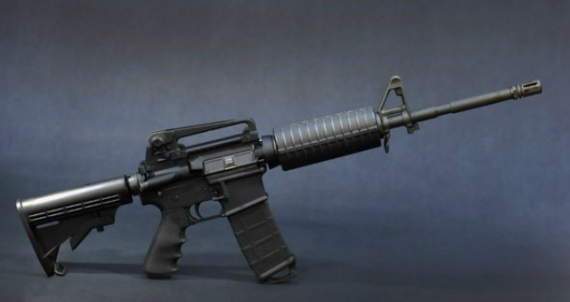

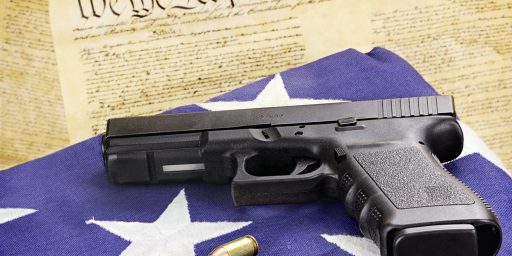
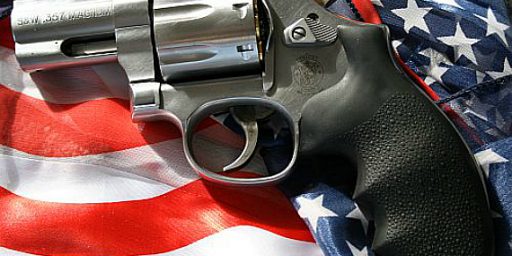
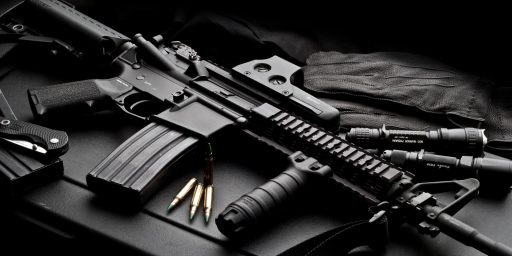
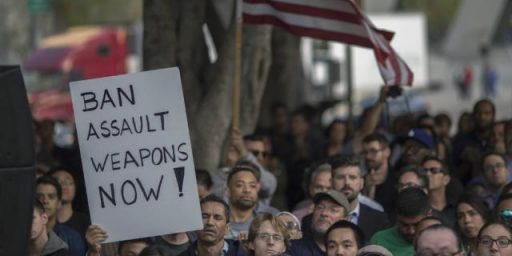
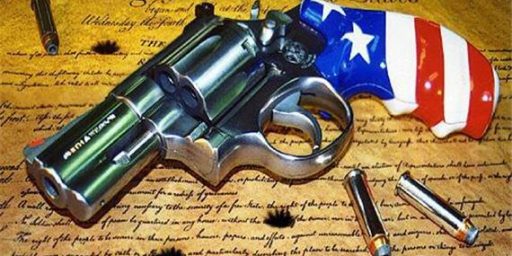
Thank you, Doug, for pointing out that under Heller it does appear an “assault weapons” ban would still be constitutional.
It seems the Second has evolved to:
But that seems to be the best we’ll get unless the makeup of the Court becomes less Republican or the level of violence gets a lot worse.
And there’s still the problem of the millions of “assault rifles” that have accumulated since the end of the last “assault weapons” ban.
And I would hope the Senate would defeat or table the pending reciprocal concealed carry bill so that it stays just “bear”, not “bear whenever and wherever they feel like.”
@gVOR08: You mean the Second Amendment doesn’t read “F**k it, I like guns”?
As said, the easiest way to get gun control passed quick as scat is to have a huge number of Black Panther look-alikes start making a huge stink about purchasing lots and lots of firepower, strutting around armed to the teeth, and making just as much of a nuisance about their “Second AMENDMENT RAAAGHTS!” as the NRA busybodies and other gun nuts.
Constitutionality aside, they’re just plain stupid. For every homicide committed with a rifle (of any type), 19 are committed with a handgun.
And when you have gun laws written by people who are not only profoundly ignorant about guns, but proud of their ignorance (that means they’re not “gun nuts!”), you’re going to get profoundly stupid laws.
The last assault weapon ban went after guns that had attachments for mounting bayonets or grenade launchers. Because we all know how useful those can be to the would-be mass murderer.
@grumpy realist: Apparently you are unaware that the NRA touts itself as “the nation’s oldest civil rights group,” and supported blacks owning guns while the Democratic Party’s militant arm — the KKK — was still lynching blacks in the south.
You probably don’t remember the time MSNBC showed a clip of an anti-Obama protester at an Obama rally who was shown carrying an AR-15. They talked about how racist the protesters were.
They carefully edited the video to avoid showing that the man with the AR-15 was black.
Personally, I think the guy was several kinds of idiot for showing up at the Obama event with his AR-15, but 1) he was within his legal rights, and 2) I feel fairly safe in saying he wasn’t a racist.
For one thing, he was surrounded by Obama supporters, and I wouldn’t put it past one of them to attack him and try to take his gun away from him — and considering how proud they tend to be of their gun ignorance, they’d almost certainly have hurt or killed someone.
I think the argument that such bans are unconstitutional is a strange one considering we had a federal ban on them for a decade and some states continue to have bans on them.
My issue with these bans has always been one of effectiveness and the practicality of trying to define “assault weapon” due to how guns are legally defined under the 1968 GCA. Also, I continue to wonder why gun control advocates don’t discuss much less seek to reform this aspect of the GCA.
@grumpy realist:
Actually, my understanding is that this is exactly what led to the crazies taking over the NRA in the first place. For decades, the NRA was pro second amendment but mainly focused on hunting (hence, the name: National RIFLE Association). But in the 60s and 70s Malcolm X and other black nationalists started encouraging blacks to arm themselves. Initially, the NRA shifted to helping the congress critters determine how best to keep guns from darkies. But a contingent protested, saying that it was hypocritical. This was the contingent most concerned with the 2nd amendment and viewed the hunting and gun safety part as a distraction. At the same time gun manufacturers realized that the more news reports that showed a black man with a gun proclaiming that he wouldn’t be pushed around any more, the more gun sales to whites went up. In fact, the more violent conflict in general, the more guns were sold. They realized that backing the 2nd amendment faction was a big win and it wasn’t long before being a psychotic with violent fantasies was the minimum job requirement for NRA officials.
GOOD GUY WITH A GUN!
@Bob The Arqubusier:
You’re afraid of Obama supporters? Why, cuz you don’t like hugs?
GEESUS H FUKING CHRIST!
you’re a freak Pearce
@MarkedMan: I’d be curious to see just where you picked up that “understanding.” Some actual accounts naming NRA officials and quoting NRA publications and statements would be quite helpful. Generic blather from NRA haters actually has negative credibility.
@James Pearce: One word, champ:
ANTIFA.
If you need more reasons, how about two words: James Hodgkinson.
(If you need a refresher, Mr. Hodgkinson was the Bernie Bro who attempted the mass assassination of Republican members of Congress last year.)
And then there’s Floyd Lee Corkins, who used the SPLC’s “hate groups” list to target the Family Research Council (and Chick-Fil-A) for a would-be massacre of his own, but lost his nerve and failed.
@MarkedMan: Several pieces about convicted murderer Harlon Carter and the ’77 Cincinnati Revolt have popped up lately. The history of the NRA’s descent into madness under Carter is as nasty as one would imagine.
@Bob The Arqubusier:
Were the Parkland school, Pulse night club and Las Vegas hotel mass shootings done with simple handguns?
@Bob The Arqubusier: Antifa? Is that still a thing?
So you’re afraid of hippies with bike lockers, then.
@Bob The Arqubusier: Then there’s Jim David Adkisson, who killed two and wounded seven at a Universalist Unitarian Church in Knoxville, TN. He confessed to wanting “to kill liberals and democrats”.
Also, those two cop-killing white militia types in Arkansas.
We could do this all day, tragically.
@al-Ameda: As I discovered in another thread, the Long Island Rail Road massacre and the 101 California Street massacre were committed with handguns. (The latter included two handguns later covered by the AWB, but were still technically handguns.)
And 9/11 involved almost 3,000 deaths with zero handguns.
Did you use any agricultural tools to pick those cherries, or was it all by hand?
@Bob The Arqubusier:
What cherry picking? You’re making an excellent argument for the wholesale banning of firearms in general and the repeal of the 2A.
I don’t suspect that was your intention, J-person-who-won’t-take-the-hint-and-leave, and it’s a vivid example of why I’ve advised you to never try to make a legal argument (or anything approaching one), but thanks anyway. I support your call for banning handguns as well as assault rifles. Thanks.
So there are more things you’re dishonest about, I see. How thoughtful of you to demonstrate it.
But I’m just dying of curiosity. Deporting 18 million illegal aliens is an insane pipe dream, but rounding up 300+ million firearms is a plausible goal. Just how do you plan on implementing that?
@Bob The Arqubusier:
Just to be clear, the people you accused of being potentially violent were “Obama supporters.” Now you’re talking about (a) a single incident involving a Bernie Sanders supporter (b) Antifa, a group comprised of far-leftists who don’t give a flip about the Democratic Party.
Finally, it’s useful to remember that right-wing terrorism is by far the most common form of domestic terrorism in the country, while left-wing terrorism is virtually nonexistent. From David Neiwert’s recent book Alt-America:
@Bob The Arqubusier:
When the James Hodgkinsons of the world come to kill you or your favorite congressman, Bob, they will do it under the gun laws you support.
Bob, Bob, Bob….if we ever get to the point where we’re rounding up guns, gun owners will have years to prepare themselves. (And they’re not going to go all Malheur over it, although some might.)
It probably won’t get to that point, though, because the GOP’s NRA-sponsored maximalist approach to gun policies is untenable and they’ll find themselves acceding to something more reasonable.
@Bob The Arqubusier:
Deporting 18 million people isn’t impossible. It’s just stupid. Can anybody explain for J E N O S what the effect of removing 18 million consumers (and producers) from the economy would be? Remember to use small words.
As for the guns? One at a time, pal. One at a f’king time. You don’t even have to seize them. Just make them effectively impossible to utilize. Sort of like what you clowns have done with abortion.
Over in Europe it is incomprehensible to understand how you can legally buy an Armalite before you can have a Bud Lite! Gun control works, just look at Australia and UK where gun controls were significantly increased after mass shootings. The last UK school shooting was at Dunblane in 1996 (Wimbledon Champ Andy Murray was a pupil at the elementary school at the time); this was pre Columbine. Admittedly UK banned all guns other than shotguns after Dunblane, but there has only been one mass shooting (12 killed in 2010) anywhere in Britain this Millenium.
@Bob The Arqubusier:
Assuming for the sake of argument that you hold yourself to be sufficiently savvy about guns to qualify as someone who could therefore be trusted to make a smart gun law, what would you include as the major elements of such a law that would serve the goal of decreasing the availability of guns to, at least, those with a higher propensity to use them against other humans?
In the interest of time, if your answer is something along the lines of “we should never pass such a law” I’m going to point out that the reluctance of people that would pass your test of not-profoundly-stupid about guns to work on such a law is exactly why any law passed to that end will be written by someone who does not pass that test. Either engage constructively or don’t complain.
@Erik: Assuming for the sake of argument that you hold yourself to be sufficiently savvy about guns to qualify as someone who could therefore be trusted to make a smart gun law, what would you include as the major elements of such a law that would serve the goal of decreasing the availability of guns to, at least, those with a higher propensity to use them against other humans?
Oh, I’m hardly an expert on guns, I freely admit — except by comparison to most of the people here who talk about guns. I know the difference between automatics and semi-automatics. I know the difference between an “assault rifle” (an actual military term) and an “assault weapon” (a term made up by people who don’t know much about guns).
As far as your notion of “decreasing the availability of guns to, at least, those with a higher propensity to use them against other humans” — that sounds like you want a Department of PreCrime, and I’m no psychic.
But I’ll take up your challenge to a certain degree, and answer almost exactly how you don’t want me to answer — “we should never pass such a law” while we have plenty of existing laws that simply weren’t used.
This shooter had about two dozen encounters with police, but was “diverted” (I think that’s the term) into alternate programs that kept him from getting criminally charged (and convicted) of a violent crime — and, therefore would have been legally unable to buy the gun he used.
This shooter made numerous violent, explicit threats to use his guns against people, who reported the threats to the authorities. Those authorities could have acted on those complaints — and chose not to.
The school and the authorities bent over backwards to keep this poor kid from the stigma of a criminal record — which would have kept him from legally buying guns. Boy, that worked out well for all concerned, didn’t it?
And they weren’t alone. The FBI had several tips that this guy was a ticking time bomb — and did nothing. Hell, he posted on YouTube under his own (rather distinctive) legal name that he wanted to be a school shooter, and the FBI wouldn’t even take that seriously.
After the shooting started, the school’s assigned police officer was in the parking lot — and stayed there. He didn’t go to confront the shooter. Maybe they didn’t want to risk giving him a criminal record then.
If you’ll pardon a hint of paternalistic tone, “why don’t you show you can use the laws you already have, and then we’ll talk about giving you new laws.”
Here’s a starting example: no more plea-bargaining away gun charges. If someone is caught with an illegal gun, or committing a crime while in possession of a gun, then they do real time in prison. This will have a disproportionate impact on inner-city residents, because nearly every city has essentially prohibitive gun laws and almost no one can legally possess a gun, so be ready for that effect and brace yourself for charges of racism. Hell, you can probably expect a civil rights lawsuit over it. And don’t expect any sympathy if you trot out the argument that inner-city minorities are the overwhelming majority of the victims of those illegal guns — as we’ve learned in Chicago, Detroit, DC, and other urban areas, murdered black people don’t count.
17 people died in the Florida school shooting. In the month of January alone, 39 people were murdered in Chicago. That’s basically one Broward County shooting every two weeks in a city where it’s virtually impossible to legally get a gun.
Which means that the predators know that, unless they cross another predator, they don’t have to worry about their victims defending themselves. And, even if they get caught, they can plea-bargain away the gun charge.
When we don’t even use the laws already on the books, why the hell would anyone think “new laws!” will do a damned bit of good?
Is that also your take on the Patriot Act, the creation of military tribunals, and all the other counter-terrorism laws, regulations and policies enacted since 9/11 – i.e., the hijackers were already on the FBI’s radar and the existing laws were sufficient to catch them if folks hadn’t dropped the ball, so no need for all the new laws that were passed, right? Ditto for immigration, I assume? I mean, it’s already illegal to, you know, be here illegally, not to mention all the existing laws against employing illegal immigrants, so until we actually start enforcing the laws on the books, no need for further enforcement mechanisms to be added, right?
@Bob The Arqubusier: Thanks for your thoughtful reply.
I have no problem with enforcing the laws that we have. Perhaps if we did we would see a decrease in gun related violence. I think it is worth examining, however, why these laws are not enforced. Perhaps it is lack of will. On the other hand, maybe it is because they are inherently difficult or unpalatable to enforce, and the right course of action is to admit that, for whatever reason, the laws we have do not achieve the effect we desire, and that we therefore need a new law or laws, along with repealing the ineffective laws as part of that reform effort (I am no fan of laws that are not, or cannot be, enforced as I think they weaken the justice system overall). I guess I think new laws might do some good because they would be more effective than the old laws, as long as they weren’t also unenforced just like the current laws.
Regarding pre-crime, I’m not looking for such a thing since I don’t believe it is achievable with a sufficient specificity (in the statistical sense). The clause that you quote from my question was meant to modify the main clause such that it did not seem that I was assuming that a good solution would necessarily decrease the availability of guns for everyone. That would certainly be one solution, but an unnecessarily blunt one if someone can determine a better way to selectively reduce availably for people that are more likely to misuse them.
@R.Dave: Oh, you wanna play the “let’s find a new way to call someone a hypocrite” game. That’s a really stupid game.
But, somehow, you actually raise one good point.
I mean, it’s already illegal to, you know, be here illegally, not to mention all the existing laws against employing illegal immigrants, so until we actually start enforcing the laws on the books, no need for further enforcement mechanisms to be added, right?
I would love it if we actually enforced the employment laws we have on the books. Use a fake ID to get a job? Identity theft charges. Knowingly hire illegals? Big fines, maybe jail time.
The one thing I remember is the “Traci Lords” exception. She was the underage porn star from the 80s. Several of her employers avoided being charged because Lords had presented really, really good fake ID. So good, in fact, that she got a US passport with it. The porn producers argued — successfully — that if her ID was good enough to fool the federal government, then they had no reason to not accept it. And it worked.
Sink some serious money into E-Verify, mandate it for every hire, and make skipping or evading or spoofing it hurt.
Oh, and you accidentally made another good point. We’ve seen, in the Trump election case, how the FBI abused the FISA process to get warrants to surveil Trump and his top people. Personally, I’d like the people who presented those bogus warrant applications to face criminal charges, and the whole FISA process given a long, hard look. If this is what it’s mainly being used for, then maybe we should scrap it.
@Erik: I wouldn’t mind a wholesale review of all the gun laws on the books. We seem to agree that quite a few of our laws fall into two categories:
1) Good laws that are rarely enforced.
2) Stupid laws that achieve nothing, or even make things worse.
(No, I’m not saying that all the gun laws fall into those two categories. I don’t think you’ll interpret it as such, but I have “faith” that several of the regulars here would.)
A review of the laws would help figure out which laws fit into one of those two categories, and help us figure out how to make things better.
And once that’s done, then we can talk about new laws to fill in any loopholes that get uncovered.
@Bob The Arqubusier: makes sense to me. It would be a reasonable place to start anyway.
@Bob The Arqubusier:
So, you’re suggesting that we should not prohibit law abiding people from purchasing passenger aircraft such as the Boeing 767?
@al-Ameda: Yes, that’s exactly what I’m saying. We need to make sure that potential mass murderers like John Travolta are prevented from acting.
Christ, are you really that stupid?
@Erik: Law professor Glenn “Instapundit” Reynolds had an intriguing suggestion: